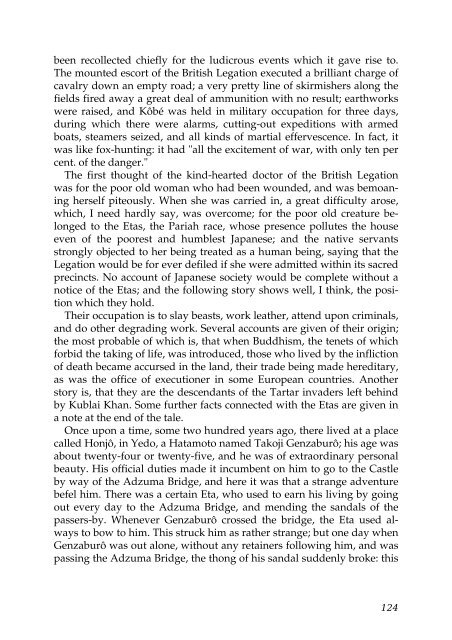You also want an ePaper? Increase the reach of your titles
YUMPU automatically turns print PDFs into web optimized ePapers that Google loves.
een recollected chiefly for the ludicrous events which it gave rise to.<br />
The mounted escort <strong>of</strong> the British Legation executed a brilliant charge <strong>of</strong><br />
cavalry down an empty road; a very pretty line <strong>of</strong> skirmishers along the<br />
fields fired away a great deal <strong>of</strong> ammunition with no result; earthworks<br />
were raised, and Kôbé was held in military occupation for three days,<br />
during which there were alarms, cutting-out expeditions with armed<br />
boats, steamers seized, and all kinds <strong>of</strong> martial effervescence. In fact, it<br />
was like fox-hunting: it had "all the excitement <strong>of</strong> war, with only ten per<br />
cent. <strong>of</strong> the danger."<br />
The first thought <strong>of</strong> the kind-hearted doctor <strong>of</strong> the British Legation<br />
was for the poor old woman who had been wounded, and was bemoaning<br />
herself piteously. When she was carried in, a great difficulty arose,<br />
which, I need hardly say, was overcome; for the poor old creature belonged<br />
to the Etas, the Pariah race, whose presence pollutes the house<br />
even <strong>of</strong> the poorest and humblest <strong>Japan</strong>ese; and the native servants<br />
strongly objected to her being treated as a human being, saying that the<br />
Legation would be for ever defiled if she were admitted within its sacred<br />
precincts. No account <strong>of</strong> <strong>Japan</strong>ese society would be complete without a<br />
notice <strong>of</strong> the Etas; and the following story shows well, I think, the position<br />
which they hold.<br />
Their occupation is to slay beasts, work leather, attend upon criminals,<br />
and do other degrading work. Several accounts are given <strong>of</strong> their origin;<br />
the most probable <strong>of</strong> which is, that when Buddhism, the tenets <strong>of</strong> which<br />
forbid the taking <strong>of</strong> life, was introduced, those who lived by the infliction<br />
<strong>of</strong> death became accursed in the land, their trade being made hereditary,<br />
as was the <strong>of</strong>fice <strong>of</strong> executioner in some European countries. Another<br />
story is, that they are the descendants <strong>of</strong> the Tartar invaders left behind<br />
by Kublai Khan. Some further facts connected with the Etas are given in<br />
a note at the end <strong>of</strong> the tale.<br />
Once upon a time, some two hundred years ago, there lived at a place<br />
called Honjô, in Yedo, a Hatamoto named Takoji Genzaburô; his age was<br />
about twenty-four or twenty-five, and he was <strong>of</strong> extraordinary personal<br />
beauty. His <strong>of</strong>ficial duties made it incumbent on him to go to the Castle<br />
by way <strong>of</strong> the Adzuma Bridge, and here it was that a strange adventure<br />
befel him. There was a certain Eta, who used to earn his living by going<br />
out every day to the Adzuma Bridge, and mending the sandals <strong>of</strong> the<br />
passers-by. Whenever Genzaburô crossed the bridge, the Eta used always<br />
to bow to him. This struck him as rather strange; but one day when<br />
Genzaburô was out alone, without any retainers following him, and was<br />
passing the Adzuma Bridge, the thong <strong>of</strong> his sandal suddenly broke: this<br />
124



